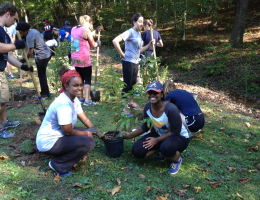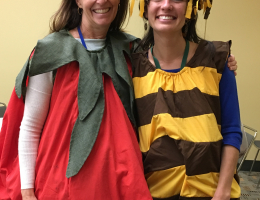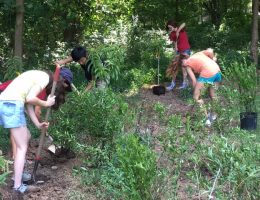Highlights
- Emory is the first university in the nation to ban the use of neonicotinoid pesticides and the purchase of plants pre-treated with neonicotinoids.
- Through pollinator protection policy, education, and action, Emory models best practices for species biodiversity protection and food system security.
- Three of Emory’s eight educational gardens (Cox Hall Garden, The School of Theology Garden, and the WoodPEC Garden) are pollinator gardens.
Concerned about the plight of bees and other pollinators, which are essential for two-thirds of the food crops we eat every day, Emory University developed a comprehensive Pollinator Protection Commitment in 2014.
Benefits
Emory does not purchase plants that are pre-treated with neonicotinoids and by making this purchasing choice is contributing to a larger movement working to change the landscaping industry.
As a result of removing invasive species on campus and planting pollinator-attractive species, we’re able to increase biodiversity by incorporating a wide variety of healthy plant species.
Adding pollinator habitats along our campus creeks and streams also enhances water quality and mitigates stormwater runoff by slowing and filtering the water before it reaches the streams.
How It Works
Emory University adopted a comprehensive Pollinator Protection Policy that…
- Eliminates neonicotinoid use on campus grounds
- Purchase plants for campus landscaping that have not been pre-treated with neonicotinoids to the extent feasible
- Specifies in contracts with vendors and campus construction standards not to use neonicotinoid insecticides or plants pre-treated with neonicotinoids
- Ensures substitutes for neonicotinoids are safe for pollinators
- Plants pollinator-friendly habitats on campus
- Conducts campus outreach and education
Read More on the Work Done at Emory
- AASHE Case Study on Emory’s Pollinator Protection Program
- Emory news article on Dr. Brosi’s study on the impact of removing bee species from ecosystems
- Dr. Brosi’s AJC op-ed on the importance of protecting pollinators



